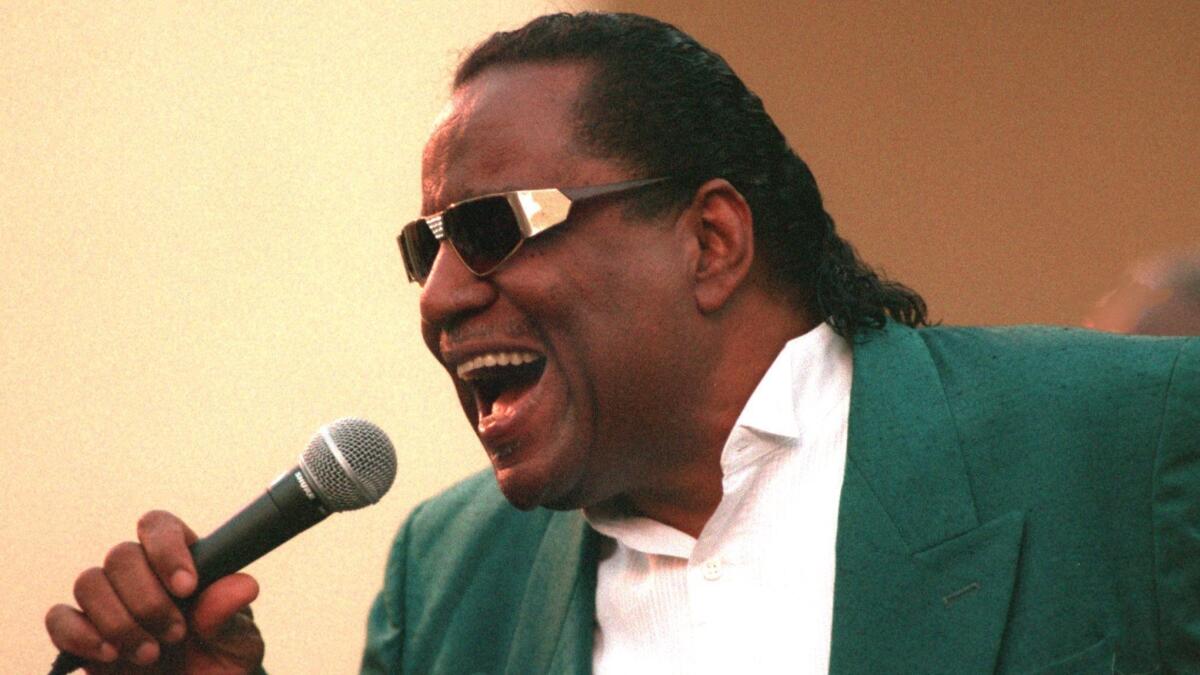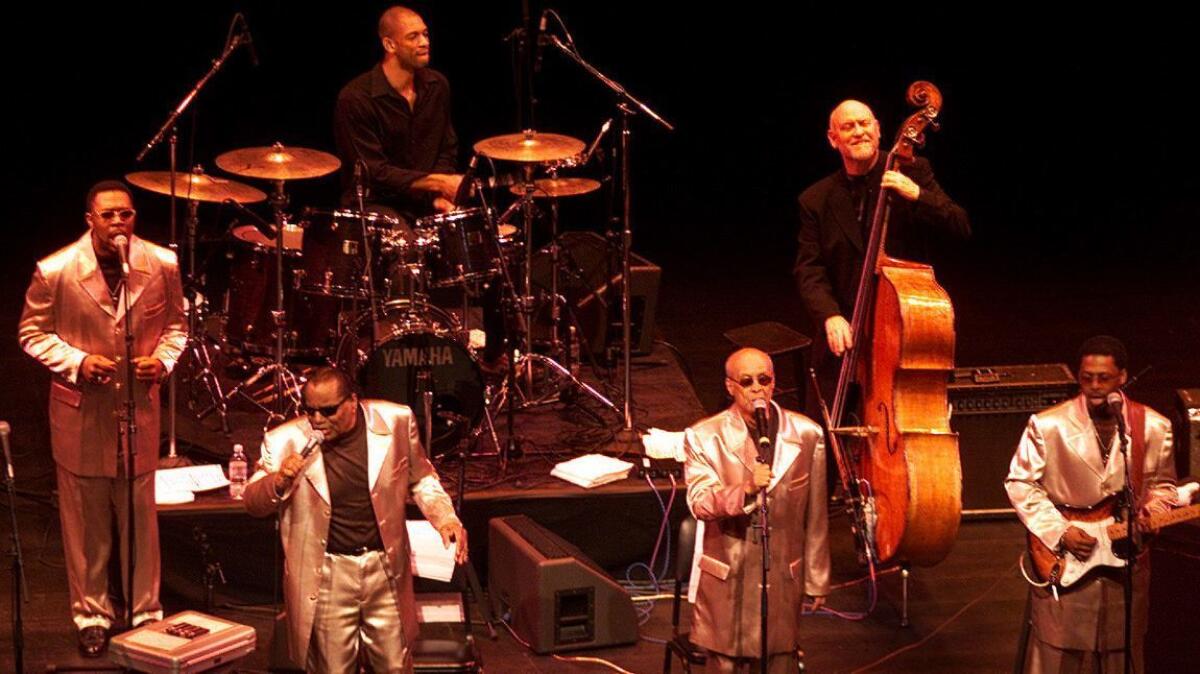Blind Boys of Alabama singer Clarence Fountain never strayed from spreading the gospel

- Share via
Few soul and R&B music aficionados ever doubted that singer Clarence Fountain, one of the three founding members of the long-running Blind Boys of Alabama gospel group, would have been one of the great secular singers of his time had he chosen that route.
But to Fountain, that was not the way God planned it.
“Our purpose comes from up above,” Fountain told The Times in 1996.
At that time, he was on one of the many tours crisscrossing the nation he and fellow original members, Jimmy Carter and George Scott, embarked on since forming the group in 1939 at the Alabama Institute for the Negro Deaf and Blind in Talladega.
“We’re cut out to do just what we’re doing,” said Fountain, who died Sunday in Baton Rouge, La., at 88.
“A long time ago, we came up with the idea that we could do this God’s way. If there’s one thing I’ve learned, it’s that if you’re gonna do something, stick with it. Do it well, and if you’re for real, faith will bring you through somewhere down the line.”

Fountain’s gravelly, electrifying vocals were often found front and center in the Blind Boys’ recordings and live performances and contributed strongly to the five Grammy Awards, plus a Lifetime Achievement Award, bestowed on the group by the Recording Academy, as well as an NEA National Heritage Fellowship and induction into the Gospel Music Hall of Fame.
“These men were raised as blind, African American males in the Deep South during the Jim Crow years, and they were sent to a school where the expectation for them was to one day make brooms or mops for a living,” the group’s manager, Charles Driebe, said in a statement. “But they transcended all that. The arc of their lives and of the band reflects the arc of a lot of changes in American society.”
Clarence Fountain was born Nov. 28, 1929, in Tyler, Ala., at the outset of the Great Depression, and was enrolled at age 8 at the facility for blind and deaf students, where he first joined the school’s large boys’ choir.

Influenced by jubilee-style gospel groups that they heard on the radio such as the Golden Gate Quartet, Fountain and several teen-aged friends started their own group, which they called the Happy Land Jubilee Singers.
They moved from the sweet, often outwardly restrained jubilee style of gospel music toward a more forceful “hard” gospel style that used powerful instrumental support rather than a cappella voices or simple piano accompaniment. That style also was favored by groups including the Dixie Hummingbirds, the Swan Silvertones and the Soul Stirrers, the latter being the springboard to pop music fame for Sam Cooke.
The Happy Land Jubilee Singers became known as “house-wreckers,” often bringing church audiences to their feet with the fervor of their performances, which regularly employed call-and-response exchanges between the lead singer and the other members of the group, sometimes with the audience itself.
They left the Alabama Institute as teenagers and began touring full time, scoring their first hit in 1948 with the song “I Can See Everybody’s Mother But Mine.”
While still performing as the Happy Land Jubilee Singers, they were booked on a bill in New Jersey with the Jackson Harmoneers from Mississippi. A wily concert promoter billed it as a battle between “The Five Blind Boys of Alabama and the Five Blind Boys of Mississippi.”
“The crowd loved us, the name stuck, and things took off for us,” Fountain remembered later.

The Los Angeles-based Specialty Records label, which launched the career of Little Richard, signed the Blind Boys in 1953, helping fill a void created by the departure that same year of the Swan Silvertones.
“I was in the studio with Sam Cooke when he signed his contract,” Fountain once said. “The man offered me one just like he did Sam, but I turned it down because that ain’t what I told the Lord I wanted to do. It’s what I promised him. When you promise God something, you don’t go back on that.”
Although Fountain never reached the heights of fame or secular fortune of gospel-turned-pop singers such as Cooke and Solomon Burke, the group continued to tour and record regularly.
They found a new audience in the early 1980s when “The Gospel at Colonus” musical theater show featured them in an Off-Broadway production, which, in turn, reached an even bigger audience after it was filmed and broadcast on public television. “The Gospel at Colonus” won two OBIE Awards and received nominations for a Pulitzer Prize and a Tony Award.
The momentum continued to build as the ‘90s opened and celebrated Memphis musician-producer Booker T. Jones produced their album “Deep River.” It landed the Blind Boys the first of an eventual 10 Grammy Award nominations. It also helped broaden their musical repertoire with spiritually minded songs from secular figures such as Bob Dylan’s “I Believe in You.”
They signed at the turn of the millennium with Peter Gabriel’s Real World Records label and put out the 2001 album “Spirit of the Century,” earning the Blind Boys their first Grammy Award after more than 50 years together.
That started a remarkable run of Grammy wins that continued for the next three consecutive years with gospel album honors going to their 2002 album, “Higher Ground,” “Go Tell It On the Mountain” in 2003 and “There Will Be a Light” in 2004. The Recording Academy bestowed a Lifetime Achievement Award on the Blind Boys in 2009, four years after Scott died at age 75.
Health issues prompted Fountain to curtail his live performances in 2007, but he did join them in the studio for their latest album, “Almost Home,” released last year.
They continued touring, with Jimmy Carter as the only remaining founding member, often eliciting ecstatic praise from audiences and music critics.
Reviewing a 2002 performance at UCLA, The Times’ longtime pop music critic Robert Hilburn said this of the group’s performance of the song “The Last Time”: “The song’s captivating balance of competing emotions reminds us why gospel music has been such a powerful force over the years — and why it remains so in the capable hands of the Blind Boys of Alabama.”
Fountain is survived by his wife, Barbara. Funeral arrangements are pending.
Follow @RandyLewis2 on Twitter.com
For Classic Rock coverage, join us on Facebook
More to Read
The biggest entertainment stories
Get our big stories about Hollywood, film, television, music, arts, culture and more right in your inbox as soon as they publish.
You may occasionally receive promotional content from the Los Angeles Times.










